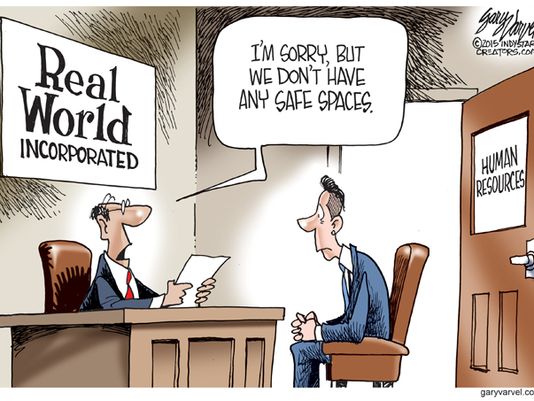Self-Absorbed Executive Search Firms: You’re Lovely, You’re Talented, You’re Dreamy. But Tact is Not Among Your Strengths.
On behalf of all candidates, to executive search firms:
“Thank you so much for your 3 [hour-long] phone interviews. I presented 8 tremendously qualified candidates to the client and unfortunately, you were not selected. But your loss is [company’s] gain. I’ll keep your info on file and contact you if something comes up.”
We may like you, but it’s not why we applied to that job you’re representing. Your client’s happiness with you means nothing to us.
One hour would have been plenty, not three.
A simple “no, thanks” is more palatable than “didn’t I do a good job?”
Please don’t insult us with passive-aggressive jibber-jabber – we know you’re not going to contact us unless we apply to another client of yours.
And please don’t tell us about other candidates. If we’re not among them, we really don’t care.
Nonprofit Arts Organizations Without Flexibility Present a Disconnect When It Really Matters
On September 12, 2001, we issued an internal memo at our nonprofit arts organization. We proffered the notion that standing by our programming and “moving forward” was the best way to fight back.
We were wrong. Putting on blinkers never helps.
On June 12, 2016, after one attack in Orlando and a foiled one in Santa Monica – key nonprofit arts organizations are right now readying memos rationalizing the same advice.
Move forward. That’ll show ‘em.
At what tipping point do we scrap activities to reflect the damage inflicted on people? Why must we wait for a year to see the first artistic responses? Why not now? Why worry about the production quality of said response? As nonprofits, when do we sacrifice our comfort zone to provide leadership to our communities for some resolution?
Or should we just move forward? Yet again?
Talk to Me Like I’m 10: a Lesson in Long-Term Planning for Artistic Directors and Board Chairs
Does long-term planning cause a rift between your artistic director and those other people?
Does it cause discord between your board chair and those other people?
Seen all the time among arts charities: carefully (and successfully) executed annual development plans reduced to rubble after the board institutes a high-priced capital campaign. The capital campaign sucks up all in its path, causing 5 years of stakeholder repair. Indispensable Chair happy. Staff leaves.
Artistic directors substituting their taste for vision and their personal and professional relationships for core values. Idiosyncrasy obviates mission. Indispensable AD happy. Board leaves.
Both cases: company imperiled, stakeholders leaving.
Time to create an action plan, written at a 5th grade level. Make it about impact rather than income. Test the theory that your arts nonprofit is indispensable. Make sure that your most important stakeholders don’t leave.
Nonprofit Arts Board Members, Executive Directors, and Staffs: Has Your Board Been Assimilated? Have You?
Board membership for a nonprofit arts organization is a privilege. It requires commitment of time and money. It requires the urge to change things for the better.
It’s not for self-aggrandizement. It is not about being thanked endlessly. It’s not about banquets, galas, and being fed.
It’s a job.
Group thinking can be inspirational, but “groupthink” can poison your organization’s health. When your board only votes unanimously, for example, or the newly-approved mission is just reverse-engineered to current activities and reduced to pabulum, you may no longer have a board. You may instead have a Borg.
Borg members wait for orders. They don’t debate. Resistance is futile.
The Borg is powerful. Borg Presidents lead by autocracy. Borg Queens (often founders) drive staff away by insisting the organization’s activities revolve around them. Borg Drones atrophy.
Board or Borg?
Special 2016 “Alan Harrison’s Birthday” Edition: Pack Up the Babies and Grab the Old Ladies – And an Easy-To-Fulfill Wish List

I was born on May 14. Conceived on a hot August night. Neil Diamond would’ve been proud. He was old enough to have a kid then, so…who knows? Brother Love? Are you my papa?
From him, I want flowers.
From you, I want (this is your cue):
- A 137-word card. ( <–Yes, that’s a link.)
- Share your favorite 137 Words post with your social network (that’s “share,” not “like”).
- To join a great company with a great mission. In Seattle.
- Health for The Kid.
- Guidance for The Kid.
- The love of my life to be happy, fulfilled, and curious. You know who you are.
- The ability for you to guide your favorite nonprofit to safety, security, and success.
- Brilliantly measurable missions, better than you believe you’re capable of.
- Complete, successful execution of those brilliant new missions.
- Pie, not cake.
Nonprofit Arts Executives: After the Ask (for anything, actually), It’s Fast “Yes,” Slow “No”… Try a Slow “Yes” Instead
If you don’t hear right away, it’s probably “no.”
That goes for asks, offers, hiring, and anything else you require.
And that goes for you, too, when your stakeholders ask, offer, hire, and anything else they may require.
Reflection is the predictable path toward rationalization to the “no.” This is why the phrase “upon reflection” is almost always followed by a version of “we’ve decided not to change.” After all, as a rule, it’s easier not to change than to take a risk.
Many arts charity executives preach the glory of “managed risk” (an oxymoron, of sorts) and value fiscal responsibility above social impact. To be clear, social impact is central to the success of the mission; fiscal responsibility is a valuable business practice.
If “yes” leads to greater impact, then stop saying “no”… especially upon reflection.
The Paradox of Simplicity: Success Begins with Better, Not More
There’s a saying that every weapon that’s been invented has been used. Or will be.
Similarly, every technological advance of the last 30 years has been used. Or will be.
More avenues of communication. More personalized offers. More database data. More news. More marketing. More music. More art. More words.
Not “better.” “More.”
This is not code for “I’m old and yearn for a simpler time.” I’m not and I don’t. What I yearn for is a better time.
Regardless of how many ways key information is dispersed, some folks just don’t consume it. And that’s on you.
I should know. You may be engaging with this post (and thank you), but others who could, don’t. And that’s on me.
A blown basketball pass is the passer’s fault. But a bad pass isn’t solved with throwing more basketballs.
Artists and Non-Offensiveness: The Tyranny of Over-Sensitivity, Feelings, and Participation Trophies

There’s a troubling trend. There’s an absurd unwillingness to offend that seems pervasive among arts creators.
Not that creators are creating “Pleasant Art,” per se. Writers and artists are creating lots of work that is designed to make audiences uncomfortable. Which is good. The work may be about single issues and not terribly complex, but it’s good.
However, there are too many artists raised in atmospheres where everyone wins, even when they lose. In the name of inclusion and self-esteem, they live in a world where, like toddlers, “feeling bad” is simply unacceptable.
They believe they’re special.
To these artists:
- You are not special.
- You do not deserve success.
- Sometimes you lose.
It’s what you do with that information that defines you.
If you believe that nobody should ever have hurt feelings, you’re not doing your job.
Arts Organizations: 137th Post, 137 Thanks, and 137 (of Other People’s) Words That Guide Inspiring Leaders
“We must reject the idea — well-intentioned, but dead wrong – that the primary path to greatness in the social sectors is to become “more like a business.” Most businesses…fall somewhere between mediocre and good.” (Collins)
“If a man does not keep pace with his companions, perhaps it is because he hears a different drummer. Let him step to the music which he hears, however measured or far away.” (Thoreau)
“People don’t buy WHAT you do, they buy WHY you do it.” (Sinek)
“When they say things like, we’re going to do this by the book, you have to ask, what book? Because it would make a big difference if it was Dostoevsky or, you know, ‘Ivanhoe.'” (Anderson)
“‘To be is to do.’ (Socrates) ‘To do is to be.’ (Sartre) ‘Do be do be do.’ (Sinatra)” [Vonnegut compilation]
Executive Directors: How Do You Control Your Self-Righteous, Burnout-Induced Rage Because, Well, Nobody Knows the Trouble You’ve Seen and Nobody Knows Your Sorrow?
I read an earnest article about burnout and its inevitability for certain nonprofits. According to the article, everyone running a charity should watch for certain signs. Included: “chronic underfunding” (always stressful in any operation), “documentation demands” (spending extra hours issuing reports for funders who do not pay for the extra time/staff necessary to prepare that report), and more.
What to do about it? I’ve tried intense sarcasm, shouting at the top of my lungs, turning crimson, and bellowing the occasional Charlie Brown “AAUGH!” Those seemed like good ideas at the time, but proved to be exactly the opposite. Funny that.
The article recommends that funders provide additional funds for a) reports and for b) executive directors to take sabbaticals.
Wow. Sounds so simple when you put it that way, doesn’t it?
Wait, there’s that sarcasm again. AAUGH.







